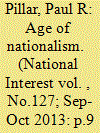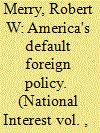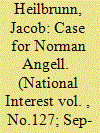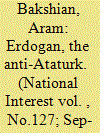|
|
|
Sort Order |
|
|
|
Items / Page
|
|
|
|
|
|
|
| Srl | Item |
| 1 |
ID:
123195


|
|
|
|
|
| Publication |
2013.
|
| Summary/Abstract |
THE URGE to apply era-defining labels to global affairs is strong and enduring. A label and a few easy-to-understand attributes associated with it can impart a reassuring simplicity to what is actually a complex and often-intractable reality. While the disadvantages of era labeling, including oversimplification, are probably as great as the advantages, the practice is here to stay.
|
|
|
|
|
|
|
|
|
|
|
|
|
|
|
|
| 2 |
ID:
123194


|
|
|
|
|
| Publication |
2013.
|
| Summary/Abstract |
PRESIDENT OBAMA'S June 13 decision to send light weapons and ammunition to Syrian rebels reflects a fundamental reality in the dialectic of American foreign policy. Within this administration and indeed throughout official Washington, humanitarian interventionism is the inevitable default position for policy makers and political insiders. There is no intellectual counterweight emanating from either party that poses a significant challenge to this powerful idea that America must act to salve the wounds of humanity wherever suffering is intense and prospects for a democratic emergence are even remotely promising.
|
|
|
|
|
|
|
|
|
|
|
|
|
|
|
|
| 3 |
ID:
123196


|
|
|
|
|
| Publication |
2013.
|
| Summary/Abstract |
CARTOGRAPHICAL CONCEPTIONS of Asia obscure what, in strategic terms, is a "Greater Asia." It stretches from eastern Iran through Central Asia and South Asia to Indonesia, and from the Aleutian Islands to Australia, encompassing the Russian Far East, China, Japan, the Korean Peninsula and Southeast Asia. It is connected by multifarious transactions, cooperative and adversarial, resulting from flows of trade and investment, energy pipelines, nationalities that spill across official borders, historical legacies that shape present perceptions, and shifting power ratios, within and among states.
|
|
|
|
|
|
|
|
|
|
|
|
|
|
|
|
| 4 |
ID:
123197


|
|
|
|
|
| Publication |
2013.
|
| Summary/Abstract |
OVER A century ago, a talented British newspaperman sent a manuscript on the irrationality of war to numerous London publishers. It was uniformly rejected on the grounds that the public was uninterested in the topic. After he paid a well-known firm to print his opuscule, it quickly garnered praise, and then, a few months later, an expanded edition became a publishing sensation. It sold several million copies and was almost immediately translated into twenty-five languages. At a moment when a highly nationalistic imperial Germany was arming itself to the teeth and Edwardian England was, in turn, bolstering its naval program, the book's thesis was as revolutionary as it was sweeping-that growing economic interdependence among nations rendered renewed conflict a thing of the past.
|
|
|
|
|
|
|
|
|
|
|
|
|
|
|
|
| 5 |
ID:
123198


|
|
|
|
|
| Publication |
2013.
|
| Summary/Abstract |
THE GROWING instability in Egypt's Sinai Peninsula represents one of the most dangerous, and most anticipated, crises in the Middle East. Even before the 2011 Egyptian revolution, the security vacuum in the Sinai allowed criminals and terrorists, including those with an ideology akin to Al Qaeda's, to expand their operations. In the chaos after the revolution, these problems have worsened. Meanwhile, various Palestinian groups use the Sinai as a launching pad for attacks against Israel.
|
|
|
|
|
|
|
|
|
|
|
|
|
|
|
|
| 6 |
ID:
123199


|
|
|
|
|
| Publication |
2013.
|
| Summary/Abstract |
THIS NOVEMBER 10, at precisely 9:05 a.m., for the seventy-fifth time in the history of the Turkish Republic, the nation will grind to a halt. In Istanbul, for sixty seconds sirens will drone, ferryboat horns will blare in the Golden Horn and traffic will freeze. Throughout the country, millions of ordinary Turks will stand still and mute to mark the death anniversary of their nation's founding father. It is an impressive moment, and deservedly so. Mustafa Kemal, known to history as Kemal Ataturk ("Father of the Turks"), was an indomitable blend of soldier, diplomat, politician, intellectual and nation builder. One of the twentieth century's most remarkable leaders, he was a man of iron will and incredible vision.
|
|
|
|
|
|
|
|
|
|
|
|
|
|
|
|
|
|
|
|
|